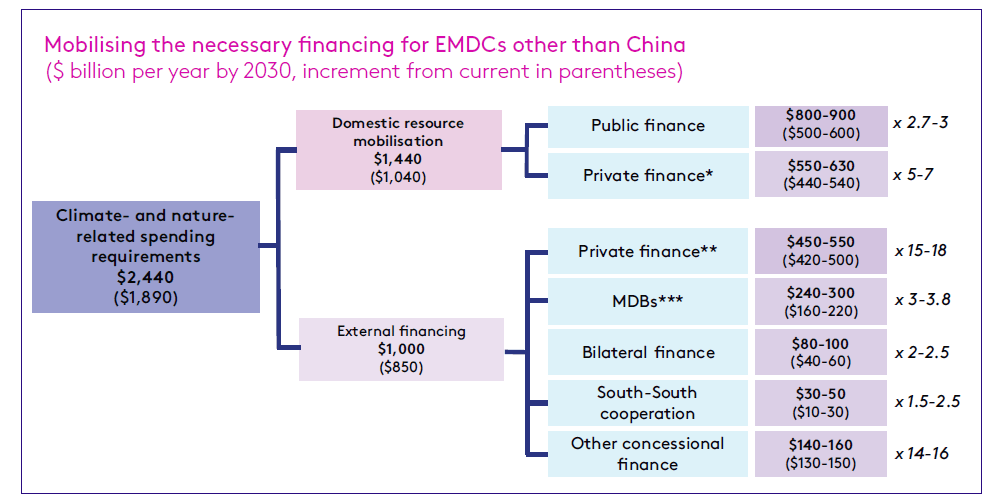COP29 – Accelerating Climate Finance
COP29 – Accelerating Climate Finance https://www.globalclimatefinanceaccelerator.com/wp-content/uploads/2024/11/beach-1024x768.jpg 1024 768 Global Climate Finance Accelerator https://www.globalclimatefinanceaccelerator.com/wp-content/uploads/2024/11/beach-1024x768.jpgCOP29 concluded on November 24, 2024. Referred to as the “Finance COP”, its central focus was on adopting a new climate finance target. Read on to explore the global progress made in climate finance.
This COP started strong, with three major advancements in climate finance negotiations:
- The “Baku Finance Goal” (BFG): A new commitment to channel $1.3 trillion of climate finance to the developing world each year to help address the negative effects of climate change
- Full operationalization of Article 6: Implementing cross border cooperation to reduce the costs of achieving national GHG emission reduction targets by up to $250 billion per year
- Full operationalization of the Loss and Damage Fund: Total pledged financial support now exceeds $730 million, with project financing to help the world’s most vulnerable countries respond to loss and damage starting in 2025
Breaking It Down: What Do These Developments Mean?
1. The Baku Finance Goal (BFG):
- The BFG contains a core target for developed countries to lead on mobilizing at least $300 billion annually for developing countries by 2035.
- As background, the previous climate finance pledge, made at COP15, committed to $100 billion annually by 2025. According to an OECD analysis, this goal was achieved for the first time in 2022.

- Additionally, Multilateral Development Banks (MDBs) announced the estimation of $170 billion climate finance annually by 2030. This includes $120 billion for low- and middle-income countries and $50 billion for high-income countries. In addition, each group has a target of mobilizing $65 billion annually from the private sector.
- Despite these efforts, gaps remain between the trillion-level goals and billion-level commitments. The COP Presidencies will lead the “Baku to Belém Roadmap to 1.3T” to make progress towards that aim in COP30 next year. Additionally, the Independent High-Level Expert Group on Climate Finance report highlights pathways to bridge these gaps:

2. Article 6 Operationalization:
- The Paris Agreement’s Article 6 allows countries to collaborate on achieving Nationally Determined Contributions (NDCs) by establishing the framework for an international carbon credit trading marketplace.

- To recap, Article 6.2 facilitates government-to-government carbon credit trading via Internationally Transferred Mitigation Outcomes (ITMOs), and Article 6.4 establishes an UN-backed carbon-crediting program. COP29 also concluded negotiations on Article 6.8 to facilitate internation cooperation through non-market approaches such as capacity-building and technical support.
- The UN first approved Article 6.4 on day one of COP29, showing a strong signal to move forward and attract more capital. Trading in carbon credits could reduce the cost of implementing countries’ NDCs by more than half – up to $250 billion by 2030, while enabling the removal of 50% more emissions (about 5 gigatons of CO2 per year by 2030) at no additional cost.
- Voluntary carbon markets may align with Article 6 standards, enhancing transparency and credibility while enabling high-integrity carbon credits to trade under Article 6. This alignment leverages existing voluntary carbon market infrastructure and supports countries and the private sector in transitioning to Article 6 markets.
- Article 6 is far from perfect at this stage. Negotiations are ongoing, with the deadline to transition Certified Emission Reductions (CERs) from the legacy Clean Development Mechanism (CDM) to Article 6.4 set for 2028. Updates to Nationally Determined Contributions (NDCs) are expected in early 2025.
- While the details will continue to evolve, the uncertainty impeding action has ended. Article 6 now represents an important and tangible tool for scaling up climate finance in developing countries.
3. The Loss and Damage Fund:
- The Loss and Damage Fund is a climate finance mechanism designed to assist developing countries that are particularly vulnerable to the adverse effects of climate change. It addresses losses and damages caused by climate-induced events such as extreme weather and sea-level rise.
- Established at COP27, the fund saw $700 million pledged at COP28 and now exceeds $730 million following COP29.
- COP29 formalized critical operational measures, including the appointment of Ibrahima Cheikh Diong as Executive Director and an agreement between the fund’s board and the World Bank. Financing projects are set to commence in 2025.
What Is Canada’s Role in Climate Finance?
- Canada announced the launch of GAIA during COP29: a US$1.48 billion blended finance platform supporting high-impact climate projects in up to 25 emerging markets and developing economies.
- 70% of the platform will support adaptation projects and 25% will invest in small island developing states and least developed countries.
- GAIA, co-founded by FinDev Canada, Mitsubishi UFJ Financial Group (MUFG), and the Green Climate Fund in 2023, exemplifies innovative financing. Structured to accelerate the availability and accessibility of long-term loans for climate projects, GAIA aims to demonstrate how a blended finance structure that combines commercial, concessional, and grant capital can catalyze private finance at scale to support projects aligned with the Paris Agreement.
- In 2021, Canada doubled its international climate finance commitment from $2.65 billion (2015-2021) to $5.3 billion (2021-2026), including 40% grant and 60% unconditional repayable contributions (akin to concessional loans).
As COP29 concludes, the progress achieved sets a strong foundation for climate finance, although significant gaps remain. The Global Climate Finance Accelerator addresses these challenges by offering innovative and affordable capital solutions through customized collaboration between partners in business, finance, government, and academia to more effectively mobilize resources.
Learn more about our work in global climate finance by visiting our Ocean Love project site. Ocean Love is pioneering sustainable and equitable growth in the blue economy by investing directly in the untapped carbon sequestration and biodiversity projection potential of local coastal communities in the Caribbean and East Africa.

Hao Tian is an independent advisor on blended finance solutions for the Global Climate Finance Accelerator. She has nearly a decade of experience in finance and sustainability across global banks and the World Bank Group. As a seasoned leader in finance and sustainability, Hao connects the dots between capital markets, VC, and the public sector across developed and developing markets by exploring collaborative pathways design and innovative blended finance solutions. Hao holds a Master of Finance degree and a Graduate Diploma in Social Responsibility and Sustainability from the University of Toronto, and a Bachelor of Economics degree from the Central University of Finance and Economics. She is a Certified Financial Risk Manager and owns IFRS (ISSB) FSA Credential.










